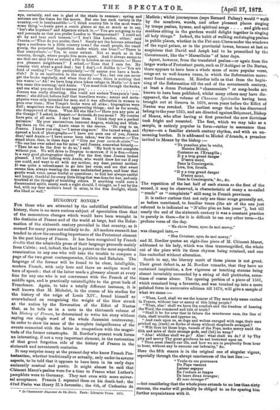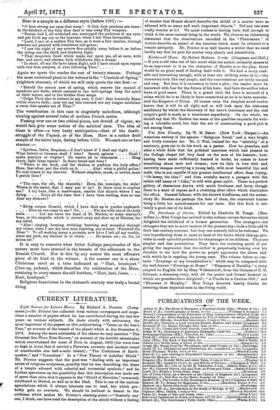HUGONOT SONGS.*
FOR those who are attracted by the unfulfilled possibilities of history, there is no more curious subject of speculation than that of the momentous changes which would have been wrought in the destinies of France and of the world at large, had the Refor- mation of the sixteenth century prevailed in that country, as it seemed for many years not unlikely to do. All modern research has tended to show the exceeding importance of the Protestant element in the past history of France. It has been recognised by French era (his that the admirable prose of their language proceeds mainly from Calvin ; and, indeed, the fact is patent on the most superficial examination to any one who will take the trouble to compare a page of the two great contemporaries, Calvin and Rabelais. The language of the former will be found to be clear, intelligible, modern French, with only here and there an antique word or 'turn of speech ; that of the latter needs a glossary almost at every tine for any one who is not conversant with the French of the middle ages, and is practically unintelligible to the great bulk of Frenchmen. Again, to take a totally different instance, it is well known that M. Michelet, in the course of his studies for the history of the reign of Louis XIV., found himself so overwhelmed on recognising the weight of the blow struck at the nation by the Revocation of the Edict of Nantes that, as he tells us in a note to the thirteenth volume of his History of France, he determined to write his story without saying one single word of the whole Jansenist controversy, in order to show his sense of the complete insignificance of the events connected with the latter in comparison with the magni- tude of the former catastrophe. M. Bordier's present work forms an interesting, if not a very important element, in the restoration of that great forgotten side of the history of France in the Sixteenth and seventeenth centuries.
It may surprise many at the present day who know French Pro- testantism, whether traditionally or actually, only under its severer aspects, to be told that it appears to have been in its early days eminently musical and poetic. It might almost be said that 'Clement Marot's psalms were for a time to France what Luther's pamphlets were to Germany. They met even with more univer- sal acceptance. Francis I. repeated them on his death-bed ; the 42nd Psalm was Henry H.'s favourite ; the 6th, of Catherine de
• Le Chansonnier Huguenot du 16e Siècle. Paris: Librairie Tross. 1871.
Medicia; whilst journeymen (says Bernard Palissy) would "walk by the meadows, woods, and other pleasant places singing by troops psalms, hymns, and spiritual songs . . . . and girls and maidens sitting in the gardens would delight together in singing all holy things." Indeed, the habit of walking and singing psalms in public places, whether in the Pre-aux-Clercs under the windows of the royal palace, or in the provincial towns, became at last so suspicious that David and Asaph had to be proscribed by the Government, like the" Marseillaise " of later days.
Apart, however, from the translated psalms—or again from the larger works of Protestant poets, such as D'Aubigne or Du Bartas, there appears to have been a whole mass of more popular verse, songs set to well-known tunes, in which the Reformation move- ment found utterance. M. Bordier tells us that from the begin- ning of the Reformation till the end of the seventeenth century, at least a dozen Protestant " chansonniers " or song-books are known to have been published, whilst many others may have dis- appeared, the last volume of Chansons Spirit uelles having been brought out at Geneva in 1678, seven years before the Edict of Nantes was revoked. The earliest songs that he has discovered belong to the year 1523, and are directed against Briconnet, Bishop of Meaux, who after having at first preached the new doctrines took fright and recanted. The first, which we may take as a sample, is entirely popular in form—rather in assonance than rhyme—on a familiar sixteeth century rhythm, and with an un- meaning burden. It is addressed to Michel d'Arande, a preacher invited to Meaux by the bishop :— "Ne preschez plus la veritd, Maistre Michel, Contenne en l'Eyangille ; II y a trop grand danger D'estre mend,
Dane la Conciergerie.
Lire, lire, lironfa.
"II y a trop grand danger D'estre mend, Dana la Conciergerie," &c.
The repetition of the last half of each stanza as the first of the second, it may be observed, is characteristic of many a so-called " ronde" or "complaints" still sung in French provinces.
it is rather curious that not only are these songs generally set, as before mentioned, to familiar tunes (the air of the one just referred to is indicated as " .N'allez plus au bois jouer "), but till nearly the end of the sixteenth century it was a constant practice to parody in them—for it is difficult to use any other term—the profane verse of the day.
"Ma chi.tre Dame, ayez de moi mercy,"
was changed into,— " Mon Crdateur, ayez de moi mercy,"
and M. Bordier quotes an eight-line piece of M. Clement Marot, addressed to his lady, which was thus transmogrified, the whole cut of the piece with its three rhymes being retained, and one line embodied without alteration.
Sooth to say, the literary merit of these pieces is not great. Their great defect is, as M. Bordier remarks, that they have no sustained inspiration, a few vigorous or touching stanzas being almost invariably succeeded by a string of dull platitudes, some- times of coarse abuse. The opening portion of a piece of 1561, which remained long a favourite, and was touched up into a more polished form in successive editions till 1678, will give a sample of what we mean :—
" When, Lord, shall we see the honour of Thy most holy name exalted in France, without fear or annoy of this lying people ?
"When, alas! shall we have the comfort and the freedom of hearing the Word, the command and tale of truth?
"Shall it be for ever that in future the murderous race, the line of Cain, shall trouble and oppress us, "And rush upon us, as dogs and wolves enraged with rage, their ears pricked up, (rush) on flocks of sheep without shepherds arranged ?
"Wilt thou let these hogs, vassals of the Pope, make merry amid the filth and mire of their strange gods, and (let) us weep?
"Alas! whither shall we go ? Alas ! what shall we do? if by Thy pity and mercy Thy great goodness be net bestowed upon us.
"Thou seest clearly our ills, and how we are in perplexity from hour to hour, without any to succour our infirmity," dm.
Here the fifth stanza is in the original one of singular vigour, especially through the abrupt conciseness of the last line :—
" Venlx-tu cos ponrceaux
Du Pape vassaux Laisser esgayer En l'ordure et fanges
De leura diens dtranges;
Et noes larmoyert" —but considering that the whole piece extends to no lees than sixty stanzas, the reader will probably be obliged to us for sparing him further acquaintance with it. Here is a sample in a different style (before 1591) :—
" 0 how strong are eyes that weep! 0 God, how precious are tears ! in the thickest of thy fury they dare to tear away Thy weapons.
"Scarce had I, all-wretched one, unstopped the moisture of my eyes, and put forth my cry to the heavens, when I felt Thee favourable. "Lord, I saw of a sudden Thy face, as it were a fair sunrise, through peerless art painted with sweetness and grace ; "I saw the night of my sorrow flee quickly away before it, as before the rising sun the thick and shadowy night.
"That desperate band which made war upon me, all at once, with fear, and cares, and alarms, bath withdrawn like a dream.
"In short, all my ills have taken flight, and I have seized upon repose with this firm purpose, of ever following Thee . "
Again we spare the reader the rest of twenty stanzas. Perhaps the most sustained piece in the volume is the "Canticle of Spring" (eighteen stanzas), of which we will only quote the two first :-
"Behold the season new of spring, which renews the enamel of meadows and fields, which restores to the well-springs deep the speed of their waters, and to the birdies their songs.
"Deign Thou also to restore in my soul, 0 God ! that heavenly flame which renews faith ; may not my lute resound nor my tongue modulate a verse that speaks not of Theo !"
The versification in this case is singularly melodious, although sinning against several rules of modern French metre.
Passing over one or two ethical pieces, not devoid of vigour, we would fain give some notion of the satirical ones. The idea of these is often—a very hasty anticipation—that of the death- struggle of the Papacy, or of the Mass. Here is a rather droll sample of the latter type, dating before 1555. We omit one or two stanzas :— " Spiritus, Salve, Requiem.—I don't know if I shall say right. . . . .
What Introit or Gramm shall I take? Sancti, agimus Shall I make martyrs or virgins ? De ventre ad te clamemus Ring there, light those tapers ! Is there bread and wine ?
"Where is the book, and the chalice, to perform the holy office ?
Here, that altar, put the cloth on it Alas! what a pitiful police ! No soul comes to my succour. Without chaplain, monk, or novice, must I perish thus ?
"The cope, the alb, the chasuble! Here, the manciple, the stole! Where is the amict, that I may put it on ? Is there none to comfort ins? I cry here, like a madwoman, amidst this church where I am dying Since all the time that I have been wailing, does no one hear my clamour?
"Bring corpus Domini, which I have shut up in yonder cupboard.
. . . . Does no one come to me ? No Fix me with one of the holy mails Let me have the head of St. Maclou, or some martyr's bone, or the ampulla which is stowed away and shut up at Rheims, for my relief.
" Alas ! singing, braying, writhing, bursting and wounded through my crime, since I see my soul soon expiring, say at least, 'Farewell the Mass '! To all making many a promise, now have I left all my wealth, since my path, my descent is to death. . . . Ito missa eat; so, Ito, ite voissa est."
It is easy to conceive what bitter feelings pasquinades of this nature must have aroused in the breasts of the adherents to the Romish Church. Nor is this by any means the most offensive piece of its kind in the volume. A far coarser one is a sham Christmas carol on a tune indicated as "Han, bouriquet " (Gee-up, jackass), which describes the celebration of the Mass, retaining in every stanza the old burthen, "Han, hari, l'asne. . . . Hari, bouriquet."
Religious fanaticism in the sixteenth century was truly a brutal thing.



































 Previous page
Previous page